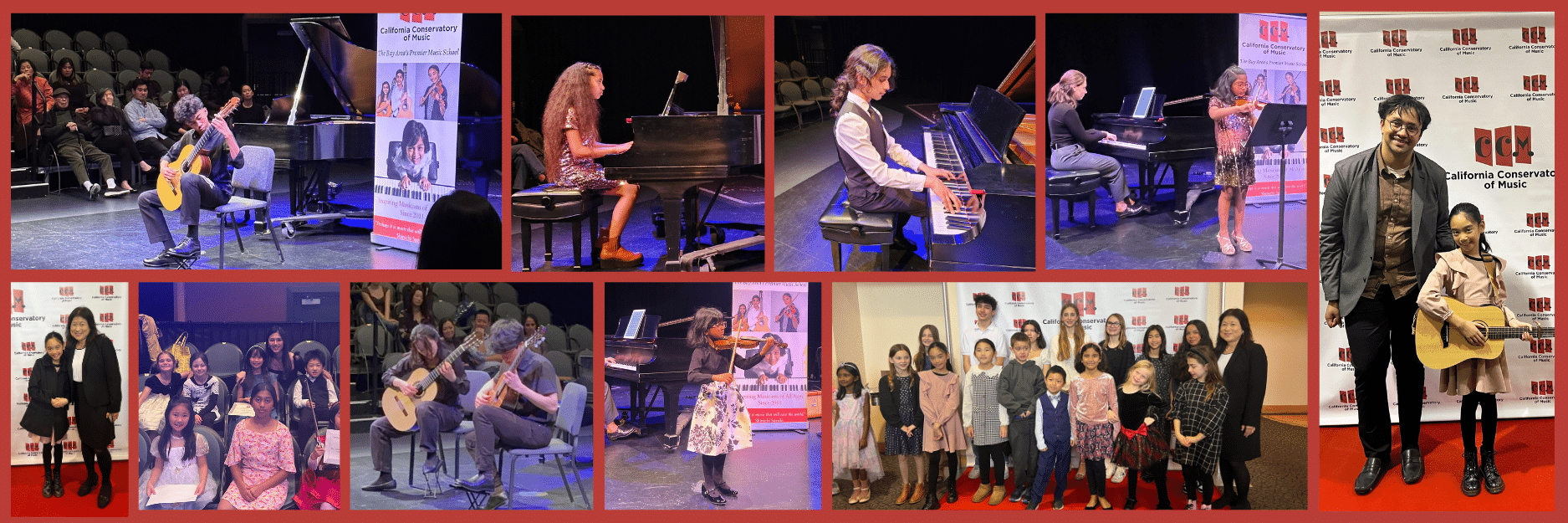Your Child’s Path to Higher Education Through Music Lessons

Music Education and Academic Success
The correlation between music lessons and academic achievement has been the subject of numerous studies. The research results consistently indicate that children engaged in music lessons perform better academically. Music lessons stimulate areas of the brain associated with language development, mathematical reasoning, and critical thinking – skills that are directly transferable to academic success and highly valued in higher education. Engaging in music also teaches children the importance of discipline and perseverance. The process of learning an instrument or mastering a piece of music requires dedication, practice, and patience. These are the same virtues that students need to navigate the challenges of higher education.Boosting Cognitive Abilities for Higher Education
One of the most significant academic benefits of music lessons is the enhancement of cognitive abilities. Music education promotes neuroplasticity, the brain’s ability to form and reorganize synaptic connections, especially in response to learning or experience. This neuroplasticity leads to increased memory capacity, heightened concentration, and improved information processing speeds – critical factors in achieving academic excellence. Moreover, the study of music involves understanding complex patterns. Learning rhythms and musical patterns mirrors the analytical skills required in subjects such as mathematics, science, and engineering. By fostering abstract thinking and problem-solving abilities, music lessons equip children with a cognitive toolkit that empowers them to tackle the rigorous demands of higher education.Enhancing Emotional and Social Development
Music education also plays a crucial role in the emotional and social development of children, preparing them for the interpersonal aspects of higher education. Participating in orchestras, bands, or choirs teaches children teamwork, collaboration, and communication skills. These experiences help students develop empathy and emotional intelligence. Additionally, they will learn to listening, adaptability, and harmonious collaboration with others towards a common goal. The confidence gained from performing can also not be understated. Music lessons often involve recitals, competitions, and public performances, which help children overcome stage fright and develop public speaking skills. This self-assuredness is invaluable in higher education environments, where presentations and group projects are commonplace.Cultural Competence and Global Awareness
In an increasingly globalized world, higher education institutions value students who exhibit cultural competence and a broad worldview. Music is a universal language that transcends cultural barriers. A thorough music education exposes children to a variety of cultures and traditions. This exposure fosters a sense of global and cultural awareness, which is of high importance in universities and professional settings alike.Music as a Differentiator in Higher Education Admissions
In the competitive landscape of higher education admissions, music education can set a child apart from their peers. Participation in music demonstrates to admissions officers that a student is well-rounded and capable of balancing academic pursuits with extracurricular activities. Furthermore, achievements in music – such as awards, certifications, or leadership positions in ensembles – can add a distinctive edge to college applications, showcasing a child’s dedication, creativity, and leadership skills. At The California Conservatory of Music, we have had several students participate and place in competitions such as the Guitar Foundation of America’s International Youth Competition. Moreover, CCM students have taken the ABRSM and RCM exams and passed with honors, distinction, and merit! These are all wonderful accomplishments that can be highlighted on a college application.Final Thoughts
The journey to higher education is multifaceted, requiring more than just academic excellence. Music lessons offer a holistic approach to child development, enhancing cognitive abilities, emotional and social skills, and cultural competence. These attributes not only prepare children for the academic rigors of higher education but also for the personal growth and challenges that come with it. By integrating music education into your child’s life, you’re providing them with invaluable tools that will aid them in their academic pursuits and beyond. The path to higher education through music lessons is one of discovery, growth, and success, illuminating your child’s journey with the enriching power of music. As we’ve seen, the benefits of music education extend well into higher education and set a solid foundation for lifelong learning and achievement. For parents contemplating the role of music in their child’s educational journey, it’s clear that music lessons are not just an investment in their musical ability but in their overall potential to thrive in higher education and beyond. Sign up for a FREE music lesson at The California Conservatory of Music today!
April Voice Student of the Month – Alexa Hengehold

This April, we’re happy to highlight CCM voice student, Alexa Hengehold, as our Student of the Month! Alexa has been taking voice lessons with teacher Kaori at our Redwood City location for half a year now! Alexa is a very hard working student and teacher Kaori says she always comes to lessons with positive energy and an open mind. Alexa recently was cast as Charlie in her school’s production of Willy Wonka Jr.! Congratulations, Alexa!
Student of the Month Questionnaire – Alexa Hengehold
What is your name?
My name is Alexa Hengehold.
How old are you?
I am 14 years old.
Who is your teacher?
My teacher is teacher Kaori.
How long have you been taking voice lessons?
I have been taking voice lessons since September.
What advice would you give to a voice student just starting out at CCM?
I would say that the most important part of voice is being yourself (or your character) and to just have fun with it.
What song are you looking forward to learning someday?
I am looking forward to learning any song from Mamma Mia because it is my favorite musical.
What is your favorite thing about singing?
My favorite thing about singing is getting to be expressive and also being able to tell a story.
What is your favorite food?
My favorite food is marble bread.
Do you have a pet?
I have two dogs, one named Ruby and a puppy named Oski.
Do you play any sports or do any other activities outside of music lessons?
I play volleyball and I am part of my school’s band and jazz band.
What do you want to be when you grow up?
I am not quite sure what I want to be when I grow up.
What is your most memorable experience at CCM?
My most memorable experience was performing at the winter concert because it was something that I had never done before and I really enjoyed it.
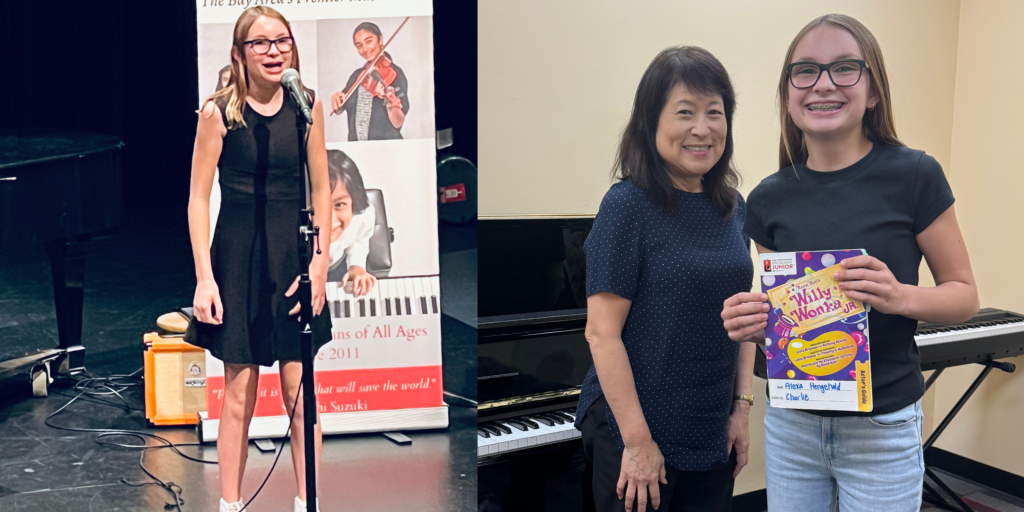
Parent Spotlight – Christina Hengehold
Alexa embarked on voice lessons just last summer, having no prior knowledge of singing. Now, she has secured one of the leading roles in her school’s performance. We couldn’t be prouder of her accomplishments!
We decided to give Alexa a musical upbringing because she has always shown a strong passion for music in various forms. Whether it’s singing, playing instruments, listening to different genres, attending concerts, or enjoying Broadway shows, music has been a significant part of her life. We believe in nurturing her interests and providing her with opportunities to explore and develop her musical talents further. By encouraging her passion for music, we hope to help her grow both personally and artistically.
Sign up for a free introductory lesson at The California Conservatory of Music!

Sergei Prokofiev: April Composer of the Month
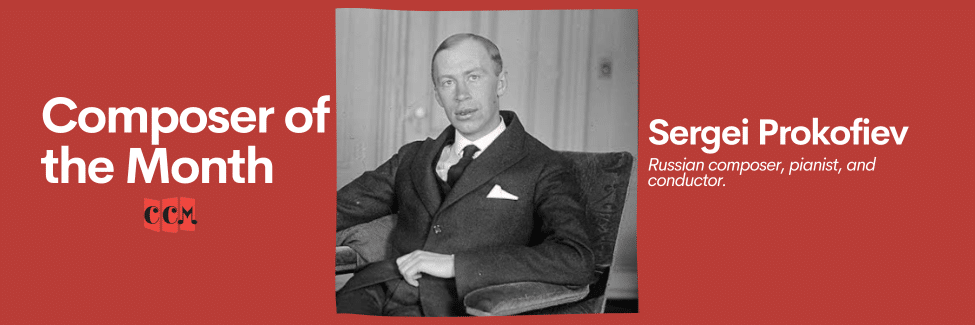
Early Life and Inspirations
Prokofiev was born in 1891 in the Russian Empire. He was a a musical prodigy and composed his first piano piece at just five years old. His mother, a pianist, was his first mentor, fostering his burgeoning talent in the rural serenity of Sontsovka. By the age of thirteen, Prokofiev’s exceptional abilities secured him a place at the St. Petersburg Conservatory. At the conservatory, he studied under giants like Nikolai Rimsky-Korsakov. His education exposed him to a breadth of musical styles and techniques. He swiftly absorbed this knowledge while nurturing a distinctive voice that often challenged conventional norms. His early works are characterized by their innovative harmonic language and rhythmic vitality. Ultimately, it was apparent at the early stages how he would go on to become a groundbreaking name in music history.Sergei Prokofiev’s Music Career
Prokofiev’s career was a rollercoaster ride that mirrored the tumultuous socio-political landscape of the 20th century. After making a name for himself in Russia, he sought new horizons in the United States and Europe. While he traveled, he achieved significant acclaim but also faced periods of hardship and obscurity. His return to the Soviet Union in the 1930s marked a complex phase of his career. He then had to navigate the demands of the state while striving to maintain artistic integrity. Despite these challenges, Prokofiev’s output remained prolific and diverse, encompassing operas, ballets, symphonies, concertos, and film music. His adaptability and unwavering creative vision showcase his resilience and artistic ingenuity.Unique Aspects of Prokofiev’s Music
Prokofiev’s music is distinguished by its blend of lyrical melodicies and dissonant harmonies. This reflected his desire to innovate within the classical tradition. He had a penchant for fairy tales and folklore, which inspired some of his most enchanting compositions. Additionally, his music often possesses a biting wit and satirical edge, revealing a keen insight into human nature and society. Prokofiev’s approach to composition was both cerebral and emotional, allowing him to craft works that engage the listener on multiple levels. His skill in orchestration is particularly noteworthy and enabled him to achieve a wide range of colors and textures that bring his musical narratives to life.Notable Works and Themes
Among Prokofiev’s vast repertoire, several works stand out for their enduring popularity and significance. “Peter and the Wolf,” a symphonic fairy tale for children, remains one of his most beloved compositions, introducing countless young listeners to the instruments of the orchestra. His ballets “Romeo and Juliet” and “Cinderella” are celebrated for their melodic beauty and dramatic depth, reimagining classic stories with fresh musical insight. The “War Sonatas” for piano are another highlight, reflecting the turbulence of World War II with profound emotional resonance. These works, along with his symphonies and concertos, showcase Prokofiev’s versatility and his ability to infuse traditional forms with a modern sensibility. Check out this performance of “Peter and the Wolf” by Vancouver Symphony Orchestra.Final Thoughts
Overall, Sergei Prokofiev’s legacy is that of a musical visionary who continually pushed the boundaries of composition. His works, characterized by their emotional depth, technical brilliance, and innovative spirit, have secured his place among the great composers of the 20th century. As we celebrate him as our Composer of the Month, we are reminded of the enduring power of music to reflect and transcend its time. Prokofiev’s journey from the conservatory in St. Petersburg to the concert halls of the world is a testament to his relentless pursuit of artistic expression. His music continues to inspire and challenge us, inviting listeners and performers alike to explore the boundless possibilities of the musical art form.

March Guitar Student of the Month – Charlie Bonnette

This March, we’re excited to spotlight CCM guitar student, Charlie Bonnette, as our Student of the Month! Charlie has been taking guitar lessons with teacher Gianfranco at our Redwood City location for a year and a half! Charlie does a great job of applying new techniques to the pieces he is working on and has made great improvement. Teacher Gianfranco says that his ambition and adaptation skills are very admirable! Additionally, Charlie’s attention to detail and positive attitude has helped him progress steadily – way to go, Charlie!
Student of the Month Questionnaire – Charlie Bonnette
Who is your teacher?
Teacher Gianfranco
How long have you been taking guitar lessons?
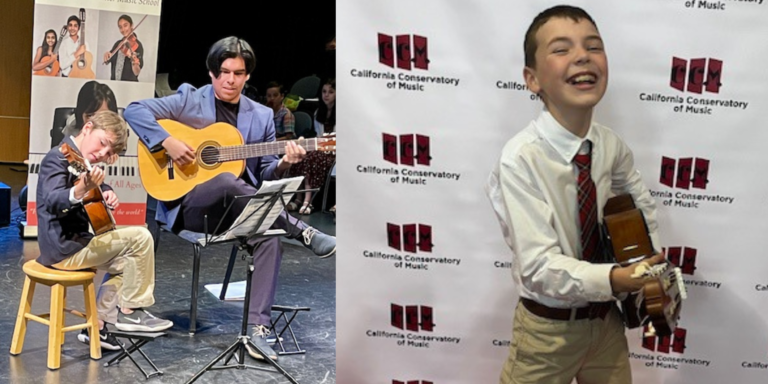
Parent Spotlight – Alyssa Bonnette
I’m so proud of Charlie for staying positive and working hard — one song at a time. Gianfranco is the absolute best at keeping him motivated and engaged. We’re grateful to have such a fantastic teacher!
Charlie has always loved music and begged to take guitar lessons. We’re following his lead!
Sign up for a free introductory lesson at The California Conservatory of Music!


Music education is more than just an extracurricular activity; it’s a journey that enhances a child’s cognitive, social, and emotional development. As a parent, supporting your child through this journey can make a significant difference in their musical and personal growth. This guide aims to help you navigate the path of music education, ensuring that your support is both effective and nurturing.
Understanding the Importance of Music Education
Before diving into how you can support your child, it’s essential to recognize the profound benefits of music education. Studies have shown that learning music can improve memory, enhance coordination, boost confidence, and even increase academic performance. Music education fosters creativity and can be a source of joy and self-expression for children. Additionally, performance and collaboration opportunities boost confidence and community!
Choosing the Right Instrument
The first step in supporting your child’s music education is helping them choose the right instrument. This choice should be guided by their interests rather than what you think might be best for them. Encourage them to explore different options and consider their physical comfort and the sound they’re drawn to. We often recommend heading to YouTube and checking out performance videos! It’s also helpful to consult with music teachers who can provide insights based on your child’s age, size, and developmental stage. At The California Conservatory of music, we offer a free introductory music lesson to every student so that they can find the right fit before signing up for lessons.
Success in Music Education
Once an instrument has been chosen, creating a conducive learning environment is crucial. Here are some ways to do this:
- Practice Environment: Designate a quiet, well-lit area where your child can practice without interruptions.
- Routine: Help your child establish a regular practice schedule. Consistency is key to progress in music education.
- Resources: Invest in quality instruments and resources like music books and online tutorials that can enhance their learning experience. Try Practice Space! This online music education platform connects students and teachers. With the in-app motivators and clear practice assignments, your child will be more engaged than ever.
Active Involvement
Being actively involved in your child’s music education doesn’t mean you need to be an expert in music. Here are a few ways you can participate:
- Attend Lessons: Whenever possible, attend lessons with your child. It shows your interest and support for their efforts.
- Encourage Practice: Encourage practice without making it feel like a chore. Celebrate their progress and be understanding of the challenges.
- Learn Together: Showing an interest in learning some aspects of music or their instrument can be incredibly motivating for your child.
Encouraging Perseverance
Music education can sometimes be challenging. There will be highs and lows, and your support can help your child navigate these with resilience. Encourage perseverance by:
- Setting Realistic Expectations: Help them understand that progress takes time and that setbacks are part of the learning process.
- Celebrating Milestones: Acknowledge achievements, no matter how small. This can boost their motivation and confidence.
- Providing Emotional Support: Be there to listen and offer encouragement when they’re feeling discouraged.
Expanding Musical Horizons
Exposing your child to a wide range of musical genres and experiences can deepen their appreciation for music and inspire them further. Consider these ideas:
- Concerts and Performances: Attend live music performances or watch them online to introduce your child to various musical styles and cultures.
- Musical Community: Engage with local music communities or online forums where your child can interact with fellow music learners.
- Creative Exploration: Encourage them to experiment with composing their own music or playing with others in a band or ensemble.
Balancing Music Education with Other Activities
While music education is valuable, it’s important to ensure that your child maintains a healthy balance with their academic responsibilities and leisure time. Help them manage their time effectively, ensuring that their passion for music enriches their life rather than overwhelms it. Balancing music with other responsibilities teaches children valuable life skills such as time management and prioritization. Encourage them to set achievable goals for both their musical pursuits and academic studies, ensuring they feel a sense of accomplishment in all areas. Open communication about their workload can help you understand when to encourage a break or when to motivate them to keep pushing forward, fostering a supportive environment that recognizes the importance of well-being alongside achievement.
Final Thoughts
Supporting your child’s music education is a rewarding journey that can significantly impact their development and happiness. By understanding the importance of music education, being actively involved, encouraging perseverance, expanding their musical horizons, and helping them maintain a healthy balance, you can play a pivotal role in their musical journey. Remember, your support, encouragement, and love for music can inspire them to reach new heights in their musical endeavors and beyond.
As parents, your support and involvement are key to unlocking the vast benefits music education has to offer, fostering not just a skilled musician, but a well-rounded individual.
Try a FREE introductory trial lesson at The California Conservatory of Music today!

Courtney Bryan: March Composer of the Month

Early Life and Education
Courtney Bryan was born in New Orleans, a city renowned for its rich musical heritage! The city immersed her into a world of diverse sounds from a very young age. This early exposure to a variety of musical genres laid the groundwork for her eclectic compositional style. Bryan pursued her passion for music through rigorous academic study, earning a B.M. in Music from Oberlin Conservatory, an M.M. in Music Composition from Rutgers University, and a D.M.A. in Music Composition from Columbia University. Her academics explored the intersections between different musical traditions, which has become a hallmark of her work.Career and Achievements
Courtney Bryan’s career is as diverse as her musical influences. She is recognized as a formidable talent in both the classical and jazz music worlds. Major orchestras and ensembles, including the New York Philharmonic and the Los Angeles Philharmonic, have commissioned Bryan’s work. Her compositions often reflect her social and spiritual convictions, addressing themes such as justice, freedom, and human rights. One of Bryan’s most notable works, “Yet Unheard,” is a powerful piece for orchestra and chorus that honors the memory of Sandra Bland and other victims of racial injustice. This work showcases Bryan’s ability to weave together text and music to create a poignant narrative that resonates deeply with listeners. In addition to her compositions, Bryan is a dedicated educator and advocate for music education. She currently serves as a professor at Tulane University, teaching composition and engaging in community outreach to bring music education to underrepresented communities. Her commitment to using music as a tool for social change is an inspiration to her students and peers.Notable Aspects of Her Music
Courtney Bryan’s music defies easy categorization, blending elements of classical, jazz, gospel, and experimental music. Her compositions are characterized by their emotional depth, intricate textures, and innovative use of harmony and rhythm. Bryan often incorporates improvisation into her works, reflecting her jazz background and her passion for spontaneous musical expression. Another distinctive feature of Bryan’s music is her use of multimedia elements. She frequently collaborates with visual artists, poets, and filmmakers to create immersive, multidisciplinary performances that challenge traditional concert formats. These collaborations highlight Bryan’s interest in exploring the connections between music and other art forms, creating unique experiences for her audiences.Final Thoughts
Courtney Bryan is a visionary composer whose work transcends musical boundaries and speaks to the pressing social issues of our time. Her ability to blend diverse musical languages into a coherent and compelling whole is a testament to her creativity and deep understanding of the power of music. As our March Composer of the Month, Bryan stands as a shining example of how music can inspire, educate, and bring about change. Through her compositions, teaching, and community engagement, Courtney Bryan continues to make a significant impact. Her dedication to exploring new musical territories while addressing themes of social justice and spiritual exploration makes her an important voice in contemporary music. As we celebrate her achievements this month, we look forward to witnessing the continued evolution of her extraordinary musical journey. Sign up for a free introductory lesson at The California Conservatory of Music!
The Academic Benefits of Music Lessons

In the fast-paced world we live in, every parent seeks to equip their child with the tools they need for academic success. Among these tools, music lessons have emerged as a unique and powerful means of enhancing a child’s educational journey. The academic benefits of music lessons extend far beyond the realm of rhythm and melody. As a parent, understanding how music education can positively influence your child’s academic performance can be crucial in making informed decisions about their extracurricular activities.
The Connection Between Music and Cognitive Development
A growing body of research supports the link between music lessons and cognitive development in children. Studies have shown that children who receive music education often display improved memory, attention span, and problem-solving skills. Learning music engages and strengthens multiple areas of the brain, thus leading to cognitive improvements.
The process of learning to read music and understand rhythm involves significant mental coordination and discipline. As a result, this translates into enhanced concentration skills and a better ability to focus on academic tasks. Additionally, the academic benefits of music lessons include improved memory retention. The practice of memorizing music pieces can boost the brain’s ability to store and recall information, a skill that is transferable to academic subjects.
Enhancing Language Skills
One of the most significant academic benefits of music lessons is the development of language skills. Music and language are closely connected in the brain, and engaging in music education can enhance a child’s linguistic abilities. Understanding rhythm and melody develops the same auditory skills needed for recognizing the nuances of language, which can lead to improved reading and comprehension abilities.
Moreover, learning an instrument requires a child to process and interpret written musical notes, a skill akin to reading words. This correlation between reading music and reading text can foster stronger literacy skills, making music education a valuable asset for language development.
Mathematics and Music: An Interconnected Learning Experience
Moreover, mathematics and music are more closely linked than they appear. The academic benefits of music lessons in improving mathematical skills are well-documented. Music is inherently mathematical; it involves understanding scales, rhythms, and time signatures, which are all based on numerical concepts.
Furthermore, children who study music are often better at recognizing patterns, a skill that is fundamental in mathematics. The process of reading music involves counting beats and rhythms, reinforcing the understanding of division, fractions, and patterns. This can translate into a more intuitive grasp of mathematical concepts in school.
Boosting Confidence and Motivation
Another significant advantage of music lessons is the enhancement of a child’s self-esteem and motivation. Mastering a musical instrument is a rewarding experience that can boost confidence. This confidence often spills over into academic pursuits, encouraging children to take on new challenges with a positive attitude.
Moreover, the discipline and dedication required to learn music are skills that are directly applicable to academic studies. Children who engage in music lessons learn the value of regular practice and perseverance. These are essential traits for achieving academic goals and tackling challenging subjects in school.
Social and Emotional Development
Cognitive and technical skills are not the only academic benefits of music lessons. Music education plays a crucial role in the social and emotional development of children. Participating in a choir, orchestra, or band teaches children the importance of teamwork, cooperation, and social interaction. These experiences can foster a sense of belonging and improve social skills, which are vital for a well-rounded academic experience.
Emotionally, music provides an outlet for expression and can help children process and communicate their feelings effectively. This emotional awareness and expression are crucial for mental well-being, directly impacting a child’s ability to focus and perform academically.
—
Overall, the cumulative impact of music education on a child’s academic performance can be profound. Children who engage in music lessons often exhibit better grades and higher test scores. This can be attributed to the enhanced cognitive skills, improved concentration, and increased confidence that music education fosters.
In addition, music education can ignite a love for learning and curiosity that extends beyond music. Children who are exposed to music often develop a broader interest in other academic subjects, leading to a more enriching educational experience.
Making Music Education Accessible
As a parent, it’s essential to recognize that the academic benefits of music lessons are within reach for every child. It’s not about creating prodigies but about enriching your child’s educational journey. At the California Conservatory of Music, we believe in making music education accessible and enjoyable for every child. Our tailored programs cater to the individual needs and interests of each student, ensuring a positive and fulfilling learning experience.
As we embark on a new year, it’s the perfect time to consider incorporating music lessons into your child’s life. The academic benefits of music lessons are clear and far-reaching. From enhanced cognitive abilities and improved language skills to better mathematical understanding and increased confidence, music education is an invaluable investment in your child’s academic and personal development.
At the California Conservatory of Music, we’re dedicated to providing top-quality music education that nurtures your child’s academic growth and fosters a lifelong love for music. We invite you to explore the world of music with us and witness the transformative power of music education in your child’s life.

Harry Burleigh – February Composer of the Month
![ComposerMusician of the Month [POST] (1) harry burleigh](https://thecaliforniaconservatory.com/wp-content/uploads/elementor/thumbs/ComposerMusician-of-the-Month-POST-1-qkkc0knao53pnyv2gqqprp094bzldumoggee953ajw.png)
In the pantheon of American composers, Harry Burleigh holds a special place. As the California Conservatory of Music’s Composer of the Month for February, we celebrate Burleigh not just for his musical genius but also for his role in shaping the American musical identity. His life and work offer a fascinating glimpse into the evolution of American music, blending African American folk music with classical traditions.
Early Life and Influences
Born on December 2, 1866, in Erie, Pennsylvania, Harry Thacker Burleigh was immersed in music from a young age. His mother and his grandfather, a instilled in him a deep love for spirituals. This early exposure to African American folk music would later become a cornerstone of his musical style.
Burleigh’s talent was evident early on. He possessed a rich, baritone voice that caught the attention of many and led to his acceptance at the National Conservatory of Music in New York City in 1892. This was a significant achievement, especially considering the racial barriers of the time.
Burleigh’s Career and Breakthroughs
At the National Conservatory, Burleigh encountered famous Czech composer, Antonín Dvořák. Coincidentally, Dvořák served as the school’s director at the time. This meeting proved pivotal for Burleigh’s career and inspiration. Dvořák recognized the uniqueness of African American spirituals and encouraged Burleigh to incorporate these into his compositions. Burleigh, in turn, introduced Dvořák to a wealth of African American spirituals and folk songs, which influenced Dvořák’s own work, notably his “Symphony No. 9” (From the New World).
Burleigh’s career spanned both performance and composition. As a singer, he became one of the first African Americans to sing professionally in a New York City concert venue. Additionally, he was a soloist at St. George’s Episcopal Church in Manhattan for over 50 years. His contributions to the church music repertoire are substantial and everlasting.
Music and Legacy
Burleigh’s most enduring legacy lies in his arrangements of African American spirituals. He transformed these works from simple songs into artful pieces suitable for concert stages, thus preserving an essential part of African American heritage and sharing it with wider audiences.
His arrangement of “Deep River” in 1916 is particularly notable. It was one of the first times an African American spiritual was adapted for a classical music setting. This opened the door for other composers to explore this genre! Burleigh’s work in this area was not just musical; it was a form of cultural preservation.
Apart from spirituals, Burleigh composed art songs and instrumental pieces. His “Southland Sketches,” written for violin and piano, blends African American melodies with classical forms, showcasing his unique compositional voice.
Harry Burleigh’s Influence and Recognition
Furthermore, Burleigh’s influence extended well beyond his own compositions. He was a mentor to many younger African American musicians, helping to pave the way for future generations of artists. His advocacy for African American music as a vital part of the American musical landscape helped to break down racial barriers in the arts.
Throughout his career, Burleigh received numerous honors and accolades. In 1917, he was awarded the Spingarn Medal by the NAACP for his achievements as a musician and for his efforts to bring African American music to a broader audience.
A Strong Legacy
Burleigh’s life was not without challenges. He faced racial prejudice and discrimination, both personally and professionally. However, he met these challenges with dignity and grace, never allowing them to hinder his commitment to music and cultural expression.
Harry T. Burleigh passed away in 1949, but his influence resonates to this day. He was a trailblazer who not only broke racial barriers but also created a musical legacy that enriched the American cultural tapestry. His work in bringing African American spirituals to the concert stage opened doors for future generations of musicians and composers, ensuring that this vital part of American heritage would not be forgotten.
As we celebrate Burleigh this Black History Month, we are reminded of the power of music to transcend barriers, to preserve history, and to enrich the human spirit. Harry Burleigh’s life and music continue to inspire, serving as a testament to the enduring power of art to effect change and foster understanding.
Sign up for a free introductory lesson at The California Conservatory of Music!

February Voice Student of the Month – Sayuri Stock
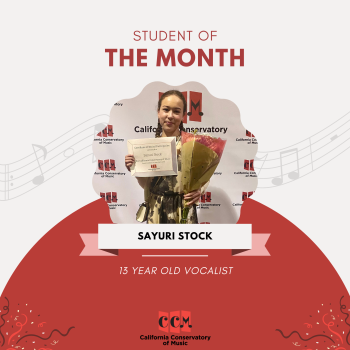
This February, we’re honored to highlight CCM voice student, Sayuri Stock, as our Student of the Month! Sayuri has been taking voice lessons with teacher Kaori at our Redwood City location since July of 2023! She has showed commitment and dedication to her voice lessons. Teacher Kaori says she always comes prepared to lessons and maintains a great attitude! Sayuri was also recently cast as Mary Poppins in her school’s production of Mary Poppins! Congratulations, Sayuri!
Student of the Month Questionnaire – Sayuri Stock
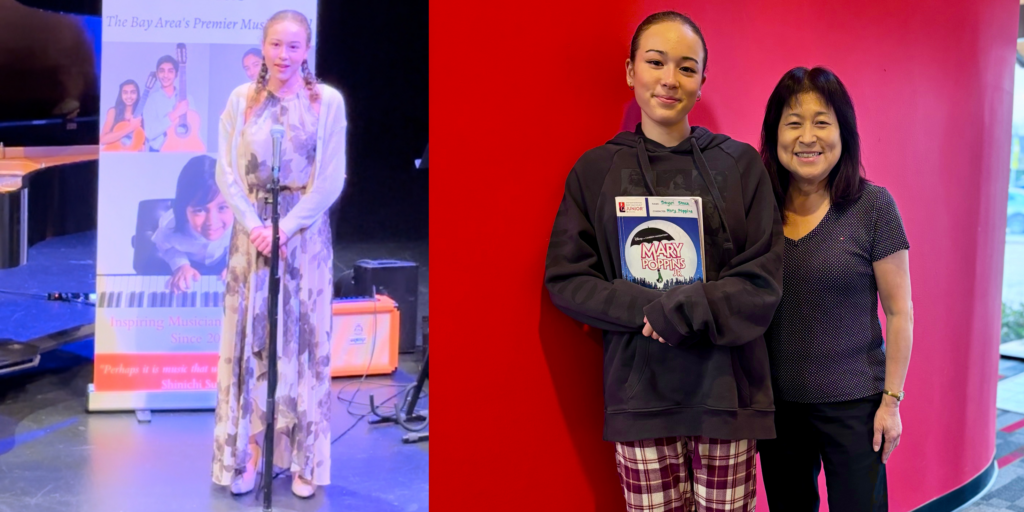
Parent Spotlight – Rika Onizuka
Getting the part of Mary Poppins in the upcoming school musical.
I feel that the arts and music are an important part of a child’s education and experience.

2024 Winter Music Recitals Recap: A Musical Success!
From everyone at the California Conservatory of Music, we extend our heartfelt thanks and congratulations to all the performers of our 2024 winter recitals. Over the past two weekends, we were thrilled to showcase the talents of over 1,000 violin, guitar, piano, and voice students at the Mountain View Center for the Performing Arts. Each recital, brimming with supportive family and friends, was a testament to the dedication and hard work the students and teachers have put into their music lessons over the past few months.

Students as young as three and a record number of adult students took the stage to perform, showcasing the diverse range of talent at CCM. For some, it was their very first time performing on stage, while for others, it marked one of their last CCM recitals before heading off to college. Each student showed incredible bravery and dedication.
We already can’t wait to hear everyone at the solo recitals in the Spring and at the ensemble recital in June.
Happy Practicing!
